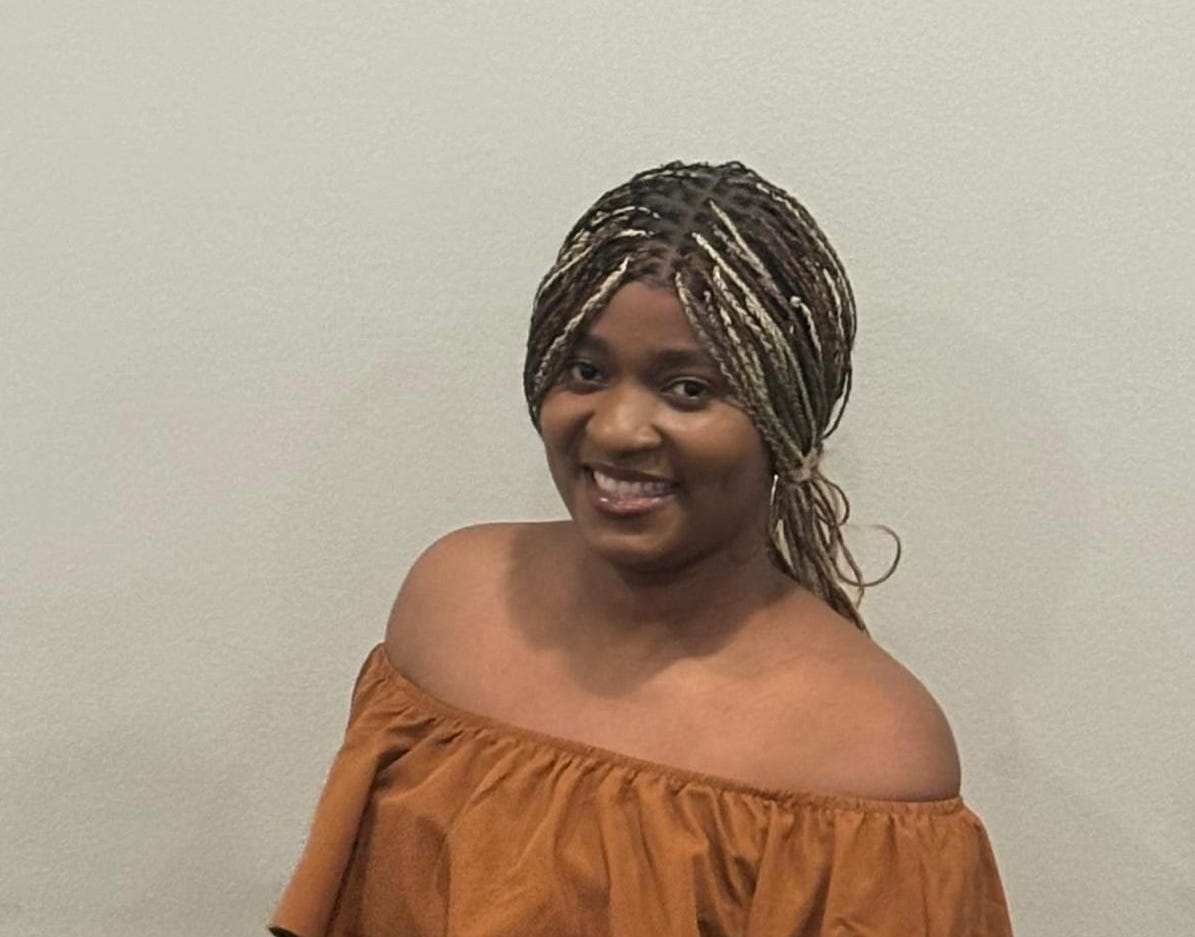
In a world where injustice persists, storytelling remains a powerful force for change. Maureen Okwulogu, a scholar and advocate for social justice, believes that theatre is not just a form of entertainment; it is a tool for activism, awareness, and collective empowerment.
- Maureen, you’ve built a strong connection between theatre and justice. How did you first become interested in this research area?
- That’s an interesting perspective. In what ways do you see theatre as a universal tool for justice, applicable both in Nigeria and the U.S.?
- How exactly does theatre contribute to social change?
- Corruption is a major challenge in Nigeria. Do you believe theatre can make a difference in combating it?
- You are now studying and working in the U.S. Do you see your research as being applicable beyond Nigeria?
- How do you see theatre functioning as a tool for activism in the digital age, both in the U.S. and globally?
- What’s your vision for the future of theatre, particularly in the context of justice and activism?
- That’s a powerful perspective, Maureen. Any final thoughts for those passionate about change?
With expertise in global film dynamics, her work spans international film distribution, Nollywood and African cinemas, cross-cultural representation, and the digital economy. She also specializes in audience reception, documentary studies, postcolonial film theory, film production management, and the exploration of cultural identity in cinema and media.
Through her research and advocacy, she highlights how communal efforts, amplified through theatre, can challenge corruption and restore faith in Nigeria’s justice system. She also explores how these same principles can be replicated in other nations, including the United States, where theatre has long been a medium for civil rights activism and social justice movements.
In this interview, she shares her insights on how theatre reflects societal struggles, inspires unity, and serves as a platform for meaningful change in both Africa and the global stage.
Maureen, you’ve built a strong connection between theatre and justice. How did you first become interested in this research area?
My interest in this subject was sparked by my observations of Nigeria’s justice system, where systemic corruption often leads to marginalization and loss of public trust. I first explored these ideas in 2018 at the University of Texas African Conference, where I presented Theatre as a Proponent for Justice. That research analyzed how theatre serves as a catalyst for activism, engaging audiences in conversations about justice, governance, and resistance.
When I received the Tertiary Education Trust Fund (TETFund) award to pursue my Ph.D. at the University of Texas at Dallas, I expanded my research beyond Nigeria. I wanted to explore how these same storytelling strategies could apply to justice movements globally, particularly in the U.S., where theatre has played a vital role in addressing racial inequality, police brutality, and mass incarceration.
That’s an interesting perspective. In what ways do you see theatre as a universal tool for justice, applicable both in Nigeria and the U.S.?
Theatre allows people to see their realities reflected on stage. It’s a medium that makes abstract or complex social issues more personal and relatable. Unlike political speeches or news reports, theatre engages emotions. When an audience watches a character endure the same struggles they face, whether it’s police brutality, political oppression, or judicial corruption, it resonates deeply. The power of theatre either as a play or film, is its ability to mirror society, expose oppression, and inspire action. While Nigeria and the U.S. may have different political landscapes, both nations share a history of social struggles, making theatre an effective medium for confronting and challenging systemic issues.
In Nigeria, playwrights like Femi Osofisan and Ola Rotimi have used theatre to critique leadership failures and social inequalities. Similarly, in the United States, theatre has played a role in civil rights movements, from Lorraine Hansberry’s A Raisin in the Sun to Anna Deavere Smith’s documentary theatre works on race and policing.
Both nations have used performance as a means of protest and resistance. By integrating African performance traditions with American theatre movements, I believe we can foster a cross-cultural exchange that deepens the dialogue on justice and representation.
How exactly does theatre contribute to social change?
I understand that viewpoint, but history tells a different story. Art has always been a catalyst for social movements. Look at Augusto Boal’s Theatre of the Oppressed—it wasn’t just about entertainment. It was designed to equip people with the tools to challenge injustice in their everyday lives. Theatre allows people to see their realities reflected on stage. It’s a medium that makes abstract or complex social issues more personal and relatable. Unlike political speeches or news reports, theatre engages emotions.
Take plays like Withered Thrust, Hands that Crush Stone, and Morountodun, for example. These works expose deep flaws in our justice system while showcasing the power of collective action. They remind people that no one fights injustice alone. Theatre encourages discussions, challenges societal norms, and often inspires people to take real-world action.
Similarly, in the United States, theatre has played a critical role in movements for civil rights and social justice. From August Wilson’s plays that highlight African American struggles to Broadway productions like The Exonerated that expose flaws in the legal system, theatre has long been a platform for marginalized voices. Today, I see an increasing need to connect these transnational narratives, because the fight for justice is universal.
Corruption is a major challenge in Nigeria. Do you believe theatre can make a difference in combating it?
Absolutely. While theatre alone won’t end corruption, it plays a crucial role in raising awareness and mobilizing resistance. When people see the same patterns of exploitation and corruption portrayed on stage, it helps them identify these issues in their own communities.
One of the biggest obstacles to fighting corruption is the feeling of helplessness. People think, “This is just how things are.” But theatre disrupts that narrative. It reminds people that injustice isn’t normal, it’s something that can and should be challenged. Plays and performances have historically been used to expose abuse, from colonial rule to modern political failures. When communities recognize their collective strength, they can demand accountability from those in power.
You are now studying and working in the U.S. Do you see your research as being applicable beyond Nigeria?
Absolutely. The themes of injustice that I’ve explored in Nigeria, such as corruption, systemic inequality, and marginalization, are not unique to any one country. In the United States, there are similar challenges, particularly in areas such as racial inequality, and the ongoing efforts for civil rights, theatre has always played a significant role in amplifying these issues in the U.S. By blending African performance traditions with American theatre movements, I believe we can foster cross-cultural dialogues that deepen our understanding of justice and representation.
How do you see theatre functioning as a tool for activism in the digital age, both in the U.S. and globally?
The digital age has revolutionized how we engage with theatre and activism. Traditionally, theatre required a physical space, but now digital platforms, streaming services, and social media allow performances to reach global audiences. This is especially important when addressing social justice issues, as theatre can now mobilize people beyond its immediate community.
For example, documentary theatre, which presents real-life testimonies and social issues on stage, has gained traction in both Nigeria and the U.S. Online platforms can amplify these performances, making them accessible to people worldwide.
My research also focuses on how the digital economy affects global film distribution and audience reception, and I see a strong intersection between this and theatre activism. By incorporating digital tools, we can expand the impact of theatre as a medium for awareness, education, and collective action.
What’s your vision for the future of theatre, particularly in the context of justice and activism?
My vision is for theatre to continue evolving as a force for social change, not only in Nigeria and the U.S. but globally. I want to see more collaborations between theatre practitioners, scholars, and activists across cultures, using performance to tackle injustice in meaningful ways. Beyond the stage, I believe we need to integrate digital platforms and film distribution strategies to expand theatre’s reach. The world is increasingly interconnected, and we must use storytelling, whether through live performance, digital theatre, or film to challenge injustice, amplify marginalized voices, and inspire action.
That’s a powerful perspective, Maureen. Any final thoughts for those passionate about change?
Change begins with us. It doesn’t matter whether you’re an artist, an activist, or an ordinary citizen; we all have a role to play in building a just society. If you’re a storyteller, tell stories that challenge corruption. If you’re an audience member, engage with theatre that promotes critical thought. Let’s embrace communal action and use the power of art to demand justice.
Theatre has always been a powerful medium for resistance, and in the digital age, its potential is even greater. Let’s embrace communal action and use the power of art to make a difference. I also encourage young creatives to use their talents to tell stories that matter. Theatre should not only entertain but also educate and empower.
WATCH TOP VIDEOS FROM NIGERIAN TRIBUNE TV
- Let’s Talk About SELF-AWARENESS
- Is Your Confidence Mistaken for Pride? Let’s talk about it
- Is Etiquette About Perfection…Or Just Not Being Rude?
- Top Psychologist Reveal 3 Signs You’re Struggling With Imposter Syndrome
- Do You Pick Up Work-Related Calls at Midnight or Never? Let’s Talk About Boundaries






